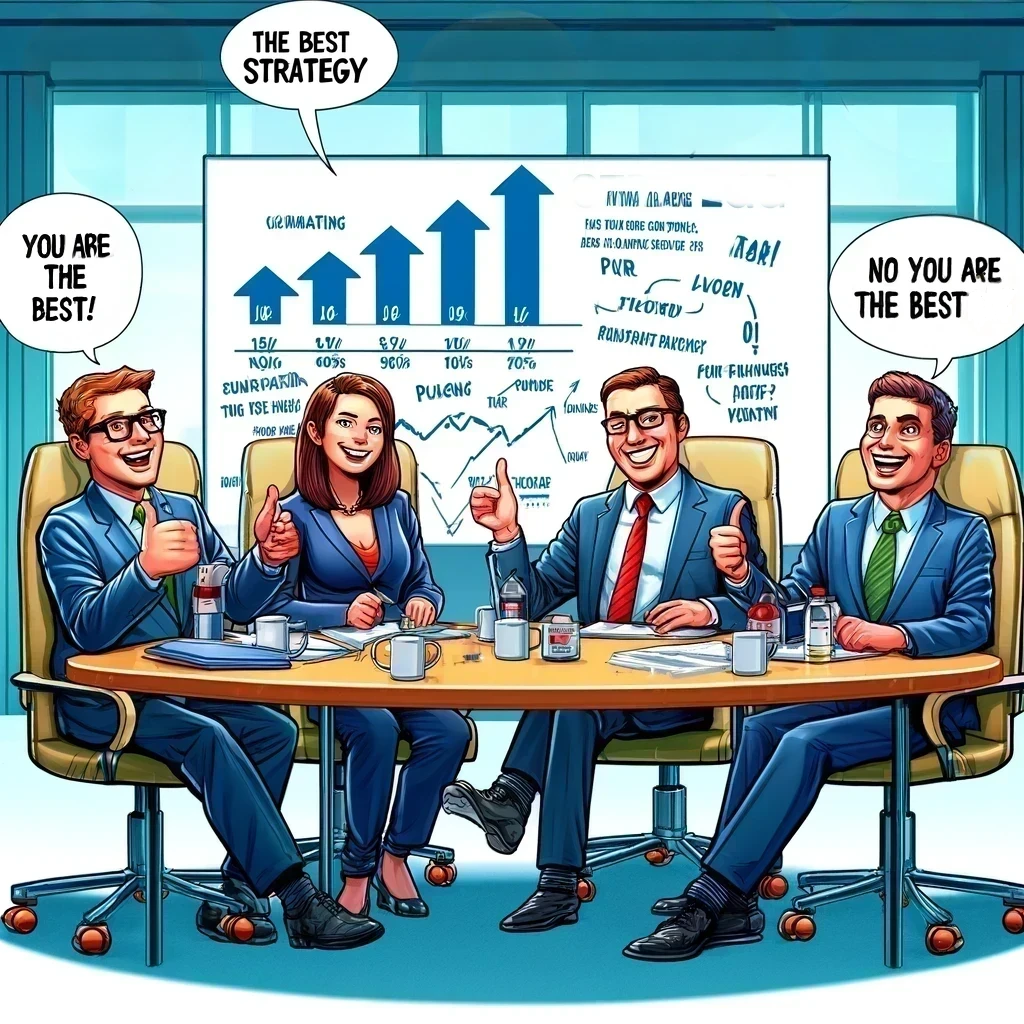
1. Cognitive Fixation Bias
Some of these other types of biases, below, it could be claimed are related to or types of ‘Cognitive Fixation’ bias, but before we get on to some of the more specific types of bias that impact SEO strategy let’s talk about cognitive fixation bias more generally. This is basically getting stuck on one idea, and then focusing on it without fully considering other ideas, it can be not considering them at all but also dismissing them without looking at them fully.
Often this happens when one idea, or way of doing things is already well understood and looked in to, sometimes due to being the status quo (status quo bias), but also it could be that it happens to be the first option looked at or the idea that an influential stakeholder has put forward. Whatever the reason, it is difficult to compare ideas fairly if the levels of knowledge and understanding of each is not equal. Bringing in people withnew ideas that have not been considered, or who have more knowledge and experience of ideas that isn’t available to a team can help to remove this bias.
For SEO Strategy specifically the problem often comes down to a strategy being a continuation of what has been done before, or being forced to fit directly in to a wider business strategy without really questioning the role of SEO.
Often with cognititive fixation bias people working on, in this case a strategy, can’t step back from what they are already doing. Stepping back far enough means really questioning the role of SEO and organic search for a business, including how it interacts with other channels and whether it is being used to deliver the right KPIs.
SEO is constantly evolving and just because in the past it was a great channel for delivering large quantities of unqualified traffic, doesn’t mean that is all it can do or what it should be doing now. Can SEO work along with UX and CRO to deliver more qualified traffic for example?
The tactics used may need to change and the make-up of the team may need to change too. Having a team full of SEOs whose main skills are on-page optimisation of existing landing page may lead to cognitive fixation on this as a key tactic and then a strategy that comes from the tactics to be used, not the other way round as it should be. Perhaps the opportunity is to change the make-up of the team by retraining or hiring new roles?
2. Confirmation Bias & Attribution Bias
With confirmation bias those putting together an SEO strategy are likely to be looking for evidence that the idea they have or the way they have done things before is the right way.
This can lead to making things fit, even when there is no concrete evidence for causation. There are so many factors in SEO and so many changes to Google’s algortihms, it can be very easy to attribute success in your current approach to your strategy, tactics and specific changes made, when that may or may not be the vase. This leads us to the related issue of attribution bias, where cause and effect are incorrectly linked together without sufficient evidence.
The level of evidence that one action caused an effect needs to be high in SEO and this is often not the case, multiple examples, across a prolonged period of time can help. Sometimes one can’t say with 100% certainty if something has been imapctful, that’s the nature of SEO, but then that needs to be considered and impact how the information available impacts a strategy and future actions.
Checking what happened to other competitors is one way to understand things better, from a different angle. Did others get a similar increase in visibility? I have come across clients who are adamant that a tactic works because they gained visibility when closer inspection shows that actually a major competitor lost visibility and they and their competitors all benefitted at the same time.
Even when there is evidence that an approach is working, that doesn’t mean that another one doesn’t have more potential, or there aren’t additional opportunities. In most SEO departments resources are finite so misattribution and misunderstanding of what is working can lead to resources being put into the wrong place and SEO strategy focusing on a small area of SEO.
Again bringing in someone from outside who has worked across similar and disperate businesses can help to remove this bias.
3. Status Quo Bias
This is probably the bias type that I have seen with clients most often, we have always done things this way so we will keep doing them this way. Like I mentioned above even if something is working to some extent maybe there is an approach that could work better.
Big, well known enterprise level companies are, in my experience, often worst for this, because all the other marketing activity and a heap of brand traffic can make SEO look good with increases in traffic every year, when actually SEO isn’t really delivering what it could and doing nothing would still see a similar growth rate.
In SEO things move fast so there should rarely, if ever, be a year where one’s SEO strategy is the same as the year before, and if the company’s strategy is changing then the SEO strategy better change to to keep up and deliver on the business’ current KPIs and fit with changes to strategy in other marketing channels and other departments.
When major changes happen in SEO then the strategy may need to change part way through a year, sometimes multiple times so also should be fluid. With AI overviews rolling out for example, which we’ve known was in the pipeline for years under one name or another, did your SEO strategy ensure that you were ready to take advantage of this? How did it impact your content strategy? Have you accepted that the role of SEO may be changing and it needs to work hand in hand with Paid search more than ever?
4. Overconfidence Bias
This is specifically about having overconfidence in one’s own knowledge or abilities, or those of yourself and your team. I have worked in house and in agency, and I know from my own experience how easy it is to, within your little bubble, think you really know everything and are completely on top of what is happeneing in the industry so can come up with the best strategy, without sense checking it and getting other opinions and experience.
Experience is something that one can’t be artificially fabricated, however the knowedge of others can be synthesized together to bring the best elements together. By getting past overconfidence bias one can bring in more opinions and experience of those who may have worked in many different businesses and industries who will have a different way of looking at things.
5. Sunk Cost Fallacy or Bias
Sunk cost fallacy often has the biggest negative impact on SEO strategies. In some cases despite multiple internal and external experts putting a point of view across I have seen companies stick to their guns due to costs they have already invested in SEO or their website.
It can be difficult for teams to admit that what they have been doing hasn’t worked or no longer works, but this is often the case in SEO, Google do sometimes move the goalposts. This may mean accepting that a content strategy that has been half rolled out won’t work and a new approach is needed, but because the cost put in to creating that content can’t be recovered people have a tendancy to keep going even when the evidence points to a change of course.
Even more of an issue is when the sunk cost is for a website that isn’t fit for purpose for SEO, UX, company needs etc. Having a website that is not fit for purpose may mean millions in lost sales if it losses visibility in search or where users get to the site but struggle to convert.
Sadly I have been involved in more than one migration in my time where I have advised a client not to launch a website and to invest in fixing underlying issues or even told them to go back, start again and replatform, and they haven’t and have lost huge amounts of visibility, traffic and sales.
I have also been involved in a migration (for an entire front end and back end of a major e-commerce platform) where after 2 years of work and several 100s of millions of dollars spent on a new system they made the decision to cancel the project. They made this, correct, decision, because this company realised that at any point they need to consider those sunken costs as what they are, sunken, lost irretriveable, and consider things a zero sum game.
Once you consider things a zero sum game you ignore what you have spent and you look at the additional costs and benefits of different options. In the case of a website migration it could be a loss of visibility and therefore traffic and sales, giving you a large loss. In the case of staying on the current website it could be staying at a similar level leading to a neutral position, a new website with a better planned project could lead to an increase in SEO visibility, conversion rate and sales, outweighing additional costs.
Having an external consultant come in in these kind of situations, who is not invested finalcially or emotionally, can allow a far more objective approach to these kind of problems and someone with experience of the impact of failed migrations and SEO strategies that were stuck with despite being out of date or based on incorrect thinking can add clout to arguments and give a clear analysis.
